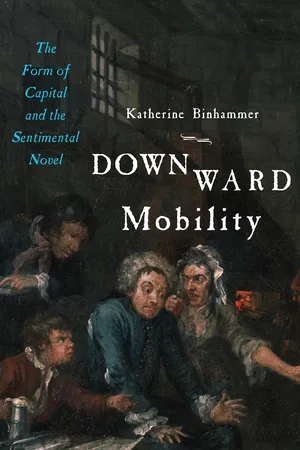
- English
- ePUB (mobile friendly)
- Available on iOS & Android
About this book
How do the stories we tell about money shape our economies?
Beginning in the late eighteenth century, as constant growth became the economic norm throughout Europe, fictional stories involving money were overwhelmingly about loss. Novel after novel tells the tale of bankruptcy and financial failure, of people losing everything and ending up in debtor's prison, of inheritances lost and daughters left orphaned and poor. In Downward Mobility, Katherine Binhammer argues that these stories of ruin are not simple tales about the losers of capitalism but narratives that help manage speculation of capital's inevitable collapse.
Bringing together contemporary critical finance studies with eighteenth-century literary history, Binhammer demonstrates the centrality of the myth of downward mobility to the cultural history of capitalism—and to the emergence of the novel in Britain. Deftly weaving economic history and formal analysis, Binhammer reveals how capitalism requires the novel's complex techniques to render infinite economic growth imaginable. She also explains why the novel's signature formal developments owe their narrative dynamics to the contradictions within capital's form.
Combining new archival research on the history of debt with original readings of sentimental novels, including Frances Burney's Cecilia and Camilla, Sarah Fielding's David Simple, and Oliver Goldsmith's The Vicar of Wakefield, Downward Mobility registers the value of literary narrative in interpreting the complex sequences behind financial capitalism, especially the belief in infinite growth that has led to current environmental crises. An audacious epilogue arms humanists with the argument that, in order to save the planet from unsustainable growth, we need to read more novels.
Frequently asked questions
- Essential is ideal for learners and professionals who enjoy exploring a wide range of subjects. Access the Essential Library with 800,000+ trusted titles and best-sellers across business, personal growth, and the humanities. Includes unlimited reading time and Standard Read Aloud voice.
- Complete: Perfect for advanced learners and researchers needing full, unrestricted access. Unlock 1.4M+ books across hundreds of subjects, including academic and specialized titles. The Complete Plan also includes advanced features like Premium Read Aloud and Research Assistant.
Please note we cannot support devices running on iOS 13 and Android 7 or earlier. Learn more about using the app.
Information
Table of contents
- Cover
- Title Page
- Copyright Page
- Contents
- List of Illustrations
- Acknowledgments
- Introduction
- 1. Fictitious Capital and the Social History of Debt
- 2. Leveraging Fiction: When Debt Becomes Equity
- 3. Narrative Exchange: The Value of Stories-within-Stories
- 4. The Plot of Capital I: Cecilia and Risk Management
- 5. The Plot of Capital II: Camilla, Closure, and the Realization of Capital
- Epilogue
- Notes
- Bibliography
- Index